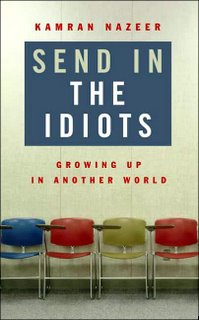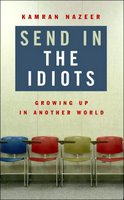>
Every reader approaches books with a unique background and attitude. When I read Kamran Nazeer’s Send in the Idiots: stories from the other side of autism, I read as a mother of an autistic teenager. With this perspective, I read closely when Nazeer talked about his classmates’ jobs and careers.
The young autistic adults in Nazeer’s book experience a variety of successes in the working world. Andre is a computer programmer who works in research. He is an expert in patterns and code, and works on new concepts in computers such as speech. The book doesn’t spend much time on Andre’s work, perhaps because his unique social relationships take precedence.
Randall is a bicycle messenger in a large city. His autism at times interferes with his work, but he is successful overall. For example, if anything, major or minor, is wrong with the bike, he has to stop and fix it immediately. This can put him behind on delivery deadlines. His supervisor understands this, and because Randall is an otherwise excellent employee, gives him leeway to manage this.
Craig, the child who once chanted the title phrase “Send in the idiots”, is now a political speechwriter. He excels in this field and writes for many prominent candidates. He has mastered the art of the sound bite, the 20-word debate answer, and the skills to weave policy and issues into motivational phrases that will rally an audience. This type of work is unsteady, however, and his skills in written language do not transfer into the interview setting. After a major election, Craig finds himself out of work and unable to connect with potential employers, even though he is an extremely capable writer. His social limitations present a roadblock to his professional success.
Social adeptness or lack of it can be a major factor professionally and personally. Later, I’ll post a short talk about social relationships in the book – another concern parents have for their children.
Category Archives: Uncategorized
>Send in the Idiots: Introduction
>
Send in the Idiots: stories from the other side of autism by Kamran Nazeer, is a new book being discussed on the autism circuit. Nazeer has autism, and he was enrolled in a special school for autistic children when he was young and lived in New York. Twenty years later, Nazeer re-connected with some of his classmates from those early years. This book is a description of their interactions and an analysis of what it’s like to have autism in today’s world.
My first reaction was an immediate aversion to the title. Idiots? Mother of a child with Asperger’s syndrome, cousin of a more severely autistic adult, and friend of many families with children on the autism spectrum, the word “idiots” struck me negatively. Based on two positive reviews, I bought the book anyway. I’m glad I did.
Send in the Idiots takes its title from an echolalia phrase repeated by one of Nazeer’s classmates. Echolalia is “…the constant disconnected use of a particular word or phrase” (p. 3) that has no meaning to others, but helps the autistic person keep order in his or her own mind. It can be repetitive or associational, predictable to those close to the person, but otherwise meaningless. The title phrase Send in the Idiots doesn’t label the children, as I feared, but is itself an example of an autistic behavior and coping skill.
Send in the Idiots is an easy read. Kamran Nazeer explains technical terms in everyday language and uses effective examples of his own or from his classmates’ lives. In fact, I’ve had to force myself to set the book down at times to resist skimming it too quickly. I want to read thoughtfully and digest every word.
I’ll post more reviews as I continue to read this valuable and fascinating book.
>Controversy’s busting out again.
>Wasn’t it enough when Victoria’s Secret stores, the hotbed of hot lingerie for hot young women, refused to allow a woman to breastfeed (in a discreet and isolated corner, mind you) in their store? Now a magazine for mothers of babies — Babies! — has generated more negative PR for mothers who are able and willing to breastfeed their infants.
One article on the cover is here. This article displays a bias, however. If you can look past the spelling error on the word “gauge” (those always lower a reporter’s credibility in my eyes), read the statistics. Apparently the magazine received 5,000 letters and emails, and 25% had a problem with it, leaving 75% either in support of it or neutral. This does not support the headline of “Breast isn’t Best: readers tell U.S. parenting magazine.” For a more objective report, try this report.
There are a few details to remember before hauling off and bashing mothers or magazine publishers.
- This magazine is not on newsstands; no one will accidentally be “forced” to see the cover. It is distributed free through OB/GYN offices.
- Breastfeeding itself is not sexual, and neither is the photo.
- The goal of this photo was to illustrate an article, not to excite or titillate (sorry, couldn’t resist).
So don’t get your undies in a bundle or your bottle in a battle. Moms have enough on their shoulders (and other parts). Let the babies eat. And let the magazines show it happening.
>Uh-oh, hold that tongue
>One of my study-group buddies brought her toddler niece along last night. The little girl was cute as can be, quiet, and well-behaved. She sat on her aunt’s lap and colored in a Strawberry Shortcake coloring book with big crayons.
During a heated discussion in which we reminisced about problems and wished for solutions, I accidentally let the phrase “s**t-list” out. Within seconds, I realized my mistake, apologized, and was reassured that the little girl was actually dozing off and hadn’t heard a thing.
Whether or not that’s true, it bothered me immensely. The sight of a toddler or young one swearing may be cute in a movie (Okay, Ben Stiller, I laughed like crazy), but it’s less attractive in real life. And the fact that as a rule I don’t use profanity made it even worse. How can someone who generally doesn’t swear let a nasty four-letter word slip in front of an impressionable language-learner? Oh, drat (or stronger), I felt and still feel lousy about it.
So, J.S., the fantastic aunt, I’m sorry . Really sorry. I know you said it didn’t matter, but I sure hope the little one doesn’t bring that phrase home.
>Deja vu all over again
>It’s like a flashback to when I was in high school. Beirut is synonymous with war, hostages are being held all over, reporters are being injured, kidnapped, and more. The only difference is that Iran was a big bad guy then, and now it’s Iraq. Oh, wait. Iran is potential trouble now, too.
A few years ago, the U.S. went in to make its “surgical strike” in Baghdad. Based on the oxymoron-type advance “intelligence”, this surgical strike was supposed to take out the key players and end the war before it even started. Um, yeah. Right.
Kids reacted. They reacted strongly, with fear and worry. One asked me, “What if war breaks out when we’re at school?” I could only answer by telling her that while I hoped it wouldn’t happen, we had a procedure in place to keep students informed and to keep them safe. She was new in our school, so I followed up by explaining how we’d handled the infamous day of September 11, 2001. She felt better then. I don’t know exactly which part of our talk made her feel better, but I’m glad we had it. Maybe all she needed was a caring adult to listen and take her fears seriously.
I’m concerned that too many kids are out of school right now, and may be watching too much TV without having any adults to care and listen and take their fears seriously. I am even more concerned that they may be taking war as just another fact of life, or something imaginary like a cartoon or video game.
So folks, I plan to listen and be there for any young ones around me. Please, for their sake, do the same for yours.


